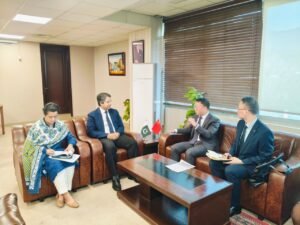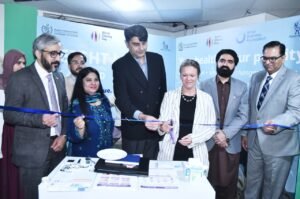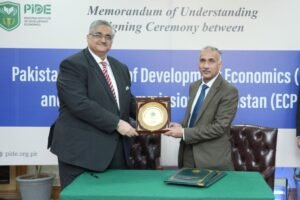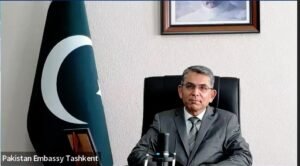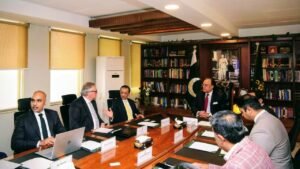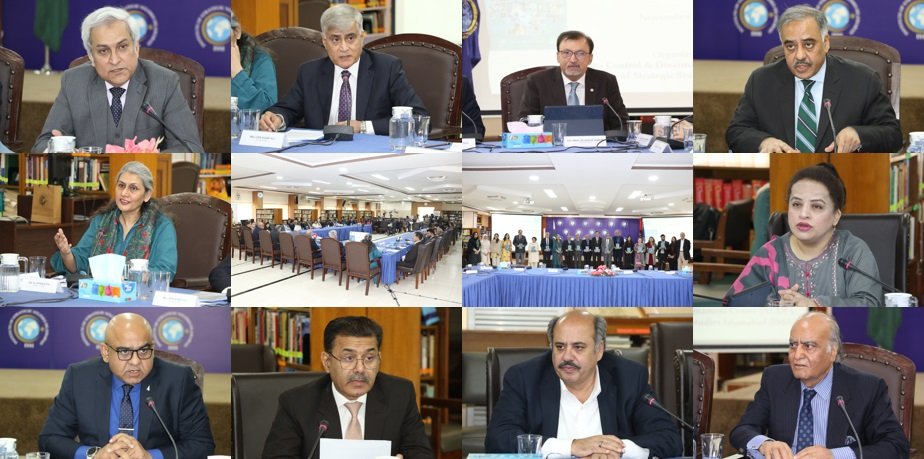
Islamabad : Arms Control and Disarmament Centre (ACDC) at the Institute of Strategic Studies Islamabad (ISSI) organized the launch of its latest book titled: A New Era of Uncertainty: Emerging Technologies and Strategic Stability. The event featured the contributing authors Air Commodore (Retd) Khalid Banuri, Advisor, Air Headquarters (AHQ); Dr. Mehreen Afzal, Director, GRC; Dr. Zafar Nawaz Jaspal, Major General Ausaf Ali, Advisor, Strategic Plans Division (SPD), Ms. Tanzeela Khalil, and Mr. Zohaib Altaf as speakers. Dr. Asma Shakir Khawaja, Executive Director, CISS-AJK, and Dr. Zahir Kazmi, Advisor, SPD, served as discussants. Ambassador Tahir Hussain Andrabi, Spokesperson, Ministry of Foreign Affairs, was the Chief Guest.
The Chief Guest, Ambassador Tahir Hussain Andrabi, lauded the book as both timely and insightful. He stated that it offered a comprehensive exploration of the use of Emerging and Disruptive Technologies (EDTs) across all five domains—land, sea, air, space, and cyberspace. He emphasized that the themes of the book are highly relevant, particularly in examining how emerging technologies are reshaping strategic stability, arms control, and crisis management. He also dilated in detail on how Pakistan is actively participating in international discourse, including at United Nations, on responsible use of AI as well as appropriate regulation of Emerging and Disruptive Technologies (EDTs).
Ambassador Sohail Mahmood, DG ISSI, highlighted that new technologies such as Artificial Intelligence, quantum computing, hypersonic missiles, and advanced cyber capabilities, along with the growing militarization of space, are fundamentally reshaping the rules of deterrence and redirecting the trajectory of global power competition. He noted that the book effectively captures the transformative essence of this technological era, serving both as an academic guide and a policy compass by exploring the intersections of technological advancement with issues of security, ethics, and power politics.
Ambassador Sohail Mahmood further emphasized that in South Asia, the effects of these technologies are especially significant, as the region’s already fragile strategic balance, marked by ongoing rivalry and asymmetry, is being further transformed by this technological revolution. He commended the ACDC team, under the leadership of Director Malik Qasim Mustafa, for conceiving, curating, and producing such a timely scholarly contribution.
Director ACDC, Qasim Mustafa, stated that the book is not intended to simply list modern weapons or predict future warfare. Instead, it examines how emerging technologies such as AI, quantum computing, cyber capabilities, and lethal autonomous weapon systems are reshaping global security, partnerships, and strategic stability.
Air Commodore (Retd) Khalid Banuri focused on the rise of emerging technologies and their impact on the nature and conduct of warfare, including its future. He explained that since the development of EDTs, the lines between peace and conflict, humans and machines, and deterrence and uncertainty have become increasingly blurred. He added that the continuous pursuit of new technologies is speeding up military transformation.
Dr. Mehreen Afzal discussed the use of AI in the cybersecurity domain. She stated that AI plays a dual role in cyberspace, acting both as a sword and a shield. While AI has immense potential to strengthen cybersecurity and enhance defence technologies, it also introduces new risks such as deepfakes, phishing, and data privacy concerns.
Major General Ausaf Ali (R) discussed the role of autonomous weapons in modern warfare, where they played key roles in surveillance and precision targeting. He highlighted the growing integration of AI in drones, noting that these technologies are low-cost yet capable of causing significant destruction. They create asymmetric challenges and lower the threshold for conflict. He emphasized the need for confidence-building measures (CBMs) and effective mechanisms to manage the use of autonomous weapons.
Dr. Zafar Jaspal explained that EDTs have major implications for nuclear deterrence and strategic stability. He noted that these technologies increase speed, precision, and lethality, changing the nature of warfare. However, opinions differ on their impact—some see EDTs strengthening deterrence, while others believe they undermine it.
The discussants appreciated the efforts of ACDC in compiling the book. Dr. Asma Shakir Khawaja noted that the book presents multiple viewpoints on the subject, offering a broader understanding of the topic. She emphasized that technology cannot replace human judgment and urged ethical innovation, strategic autonomy, and balanced doctrinal and technological advancement for stability. Similarly, Dr. Zahir Kazmi highlighted that emerging technologies are transforming deterrence, power dynamics, and the legal foundations of warfare. He stressed that technology has outpaced strategy and law, urging the need for doctrinal innovation and ethical governance.
The event concluded with a vote of thanks by Ambassador Khalid Mahmood, Chairman BoG, ISSI, and a group photo.


